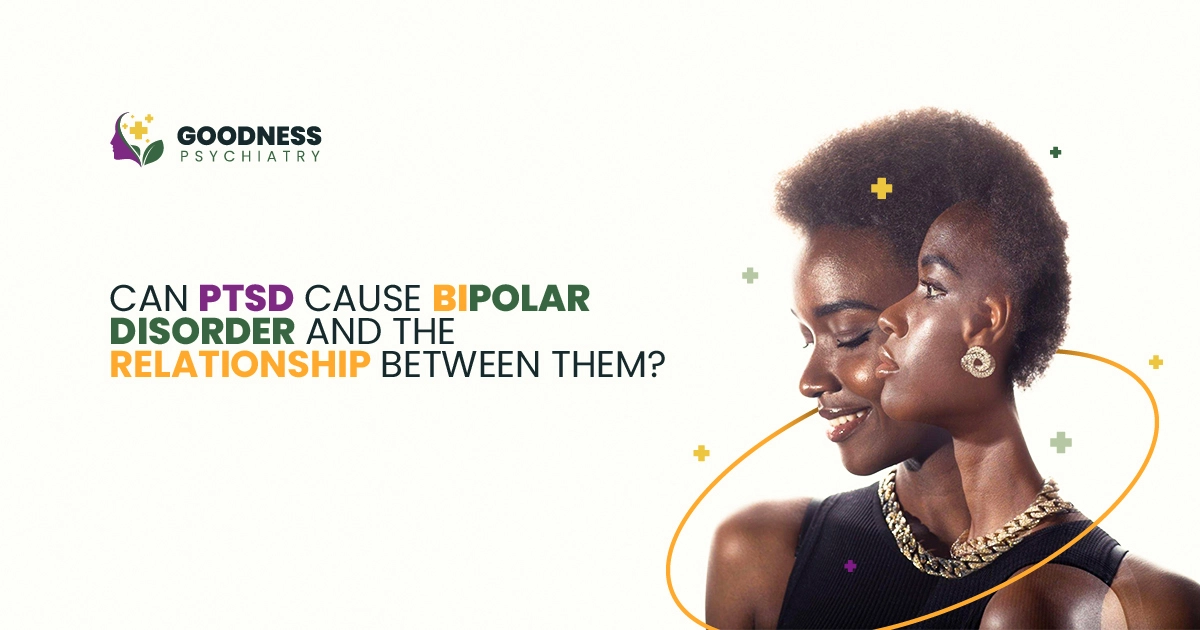Everyone has tough things happen in their lives sometimes. Scary or sad events can catch us by surprise. These experiences may cause many different feelings, like fear or worry.
Can PTSD cause bipolar disorder? Let’s resolve this concern together and find the answer.
For some people, those feelings from bad memories don’t go away and can lead to problems like PTSD and bipolar disorders.
This means the scary events keep repeating in their heads. Bad times could also trigger bipolar and PTSD, which makes moods change a lot.
Similarly, thinking about what happened repeatedly makes the feelings stronger, too. Seeking help from a doctor is a good idea when trouble with feelings lasts a long time. Professionals know ways to help feel better without scary memories in charge.
Goodness Psychiatry helps people through talking and tests. Their goal isn’t dwelling on the past but moving ahead happier.
Bad times don’t define anything; there is always hope!
Can PTSD Cause Bipolar Disorder?
Sometimes, people with bipolar also have PTSD. This makes doctors wonder if PTSD could turn into bipolar for the first time. If a big fear caused PTSD mania, could it start bipolar, too?
Bipolar runs in families. Doctors think big fears might make a bipolar start in people already at risk for it. When PTSD bipolar disorder doesn’t let go of scary memories, it could change how moods work.
Additionally, not all experts agree though. More research is needed to know if PTSD truly causes bipolar or if they commonly happen together for other reasons.
While a connection seems possible, the proof is still missing on whether PTSD makes bipolar begin. However, help from counselors can treat both problems to feel better without bad thoughts ruling moods. Bipolar and PTSD together can cause severe trauma and depression.
What does the research say?
A 2016 research review examined various studies investigating the connection between bipolar disorder and PTSD. The findings suggested that experiencing trauma not only raised the risk of developing bipolar disorder.
It also appeared to result in more intense symptoms, such as thoughts of suicide or actual suicide attempts.
Additionally, a nationwide study conducted in 2016 utilized the Danish Civil Registration System to investigate potential associations between bipolar disorder, schizophrenia spectrum disorders, and being diagnosed with PTSD or acute stress reaction.
Certainly, as indicated by additional research, the connection could also work the other way around. During manic episodes, individuals often experience heightened impulsivity.
This increased impulsiveness can lead to risky behaviors, putting them in potentially dangerous situations or causing harm to themselves or others.
Examples include;
- Driving at excessive speeds
- Attempting extreme sports without safety measures
- Getting into conflicts with authority figures like a boss.
When these situations result in negative outcomes, it can lead to lasting trauma for both the person involved and those around them.
Can you have both PTSD and bipolar disorder?
It’s okay to have both conditions, and many people do. If you have PTSD, it might make it more likely for you to have bipolar disorder.
On the flip side, having bipolar ptsd disorder could indirectly increase the chance of going through a tough experience.
Other studies show that either condition can affect the other. In a study from 2020, they looked at 212 people with bipolar disorder who were getting care at the hospital.
A bit more than 72 percent of them had been through some tough situation, and over 35 percent had been diagnosed with PTSD.
Based on a review of 32 studies conducted in 2017:
- Average va rating for bipolar disorder is between 4 and 40 percent of individuals with bipolar disorder also fit the criteria for PTSD.
- PTSD seemed to be more common in women and those with bipolar I.
- For people dealing with PTSD, around 6 to 55 percent of them also met the criteria for bipolar disorder.
- Individuals facing both conditions described more challenging symptoms and a lower quality of life.
PTSD and Bipolar Disorder: Exploring the Relationship
- Numerous research studies have consistently shown that PTSD and bipolar disorder frequently co-occur.
- It is common for individuals with bipolar disorder to also have a diagnosis of PTSD, often due to traumatic life experiences.
- However, the precise relationship between the two conditions and whether one can directly cause the other is still being investigated.
- While studies demonstrate high rates of these disorders co-occurring, the exact nature of their links and potential causal relationships still require more research to understand fully.
- Both PTSD and bipolar disorder are complex conditions with distinct genetic and environmental risk factors.
- While they frequently co-occur, one does not strictly cause the other.
- Experiencing traumatic events, as defined in PTSD, may potentially trigger the onset of bipolar disorder in individuals who are already genetically or biologically predisposed to developing the condition.
- However, trauma alone does not definitively cause bipolar in every case. An underlying vulnerability needs to be present.
- The relationship between the two disorders is complex, with many interacting factors, not a simple causative relationship.
- Simplifying it as one directly causing the other fails to account for the multifaceted nature of mental health conditions and all their risks and influences.
Symptoms of PTSD and bipolar disorder

PTSD symptoms
PTSD symptoms usually begin within three months of the upsetting event. These symptoms can be grouped into different categories:
Avoidance Symptoms
- Try to avoid places or things that remind you of the event.
- Avoiding thoughts or memories about the trauma.
Arousal and Reactivity Symptoms
- Getting easily startled or frightened.
- Finding it hard to focus or concentrate.
- Having outbursts of anger.
- Feeling tense or on edge.
- Struggling to fall asleep.
- Engaging in behavior that might be harmful.
Cognition (Thinking) and Mood Symptoms
- Having negative thoughts about yourself or the world.
- Losing interest in things you used to enjoy.
- Finding it challenging to remember important details about the event.
Bipolar disorder symptoms
It revolves around shifts between mood episodes of mania and depression, each lasting for days or weeks.
- Feeling extremely joyful or irritable.
- Having less need for sleep.
- Experiencing racing thoughts.
- Speaking rapidly.
- Feeling wired or excessively active.
- Feeling persistently sad.
- Struggling with sleep, either sleeping too much or having difficulty sleeping.
Treatment for PTSD and bipolar disorder
It’s really important to get help if you’re dealing with PTSD or bipolar disorder. When you feel overwhelmed by these conditions, it can affect your thoughts. The best thing to do is to see a doctor who can suggest either talking therapy or medication.
The doctor will guide you on the best option. It’s crucial to seek professional help!
Let’s Recap
Can PTSD cause bipolar disorder? It all depends on the situation and the condition of the patient. Bad things that cause PTSD might make bipolar start in some people who are already likely to get it. But PTSD by itself does not always cause bipolar. It depends on what kind of problems each person has and what made them feel bad before.
It’s very important to tell doctors everything you feel, even small problems. Give lots of details. Don’t worry about sharing too much. The details help doctors know exactly what’s wrong. This leads to the right diagnosis and treatment plan. Bipolar and PTSD can both get better with help. But their treatments are very different. That’s why it’s best to see someone with much experience. They understand these problems well.
So, feel free to trust and contact us anytime without any worries!

